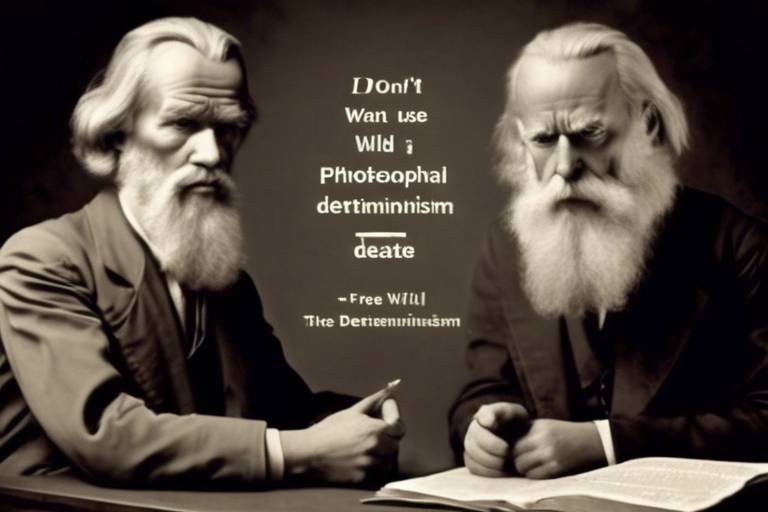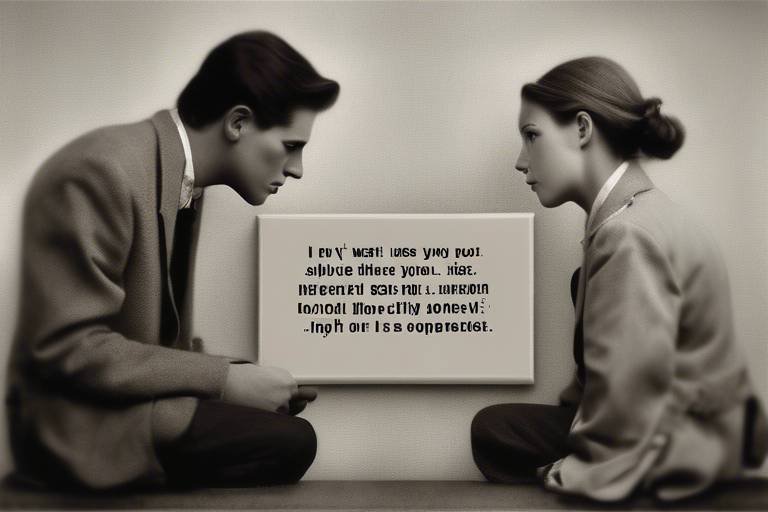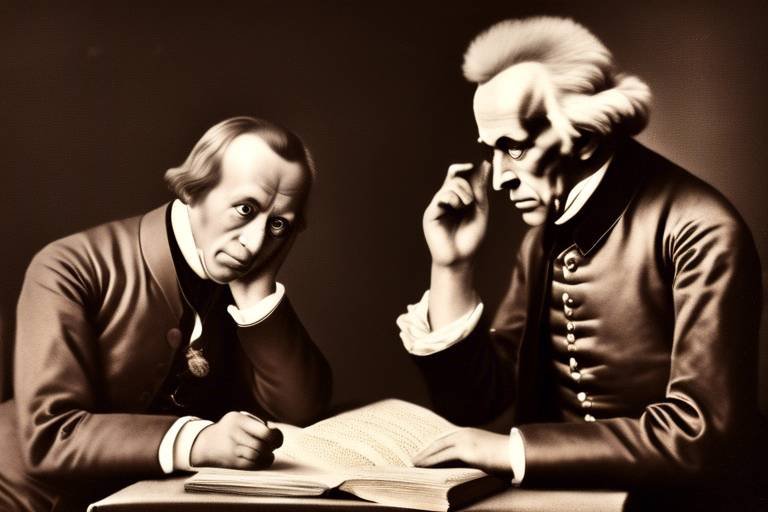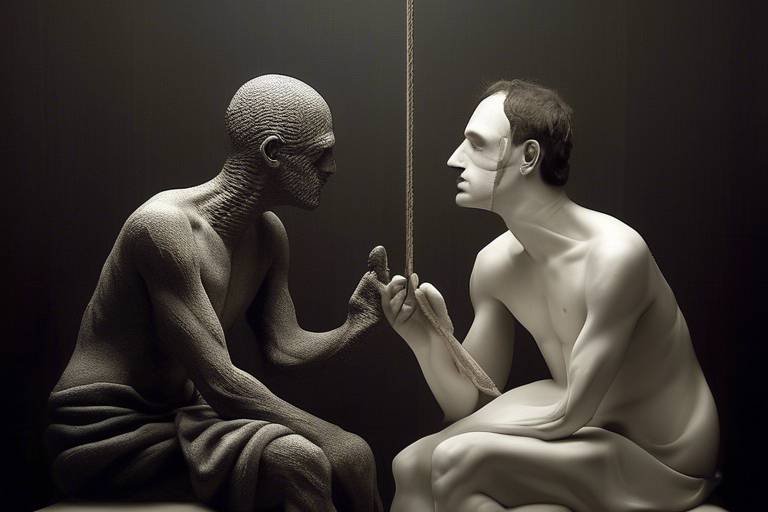Existence Before Essence - A Sartrean View
Have you ever pondered the meaning of your existence? Jean-Paul Sartre, a prominent figure in existential philosophy, believed that existence precedes essence. This radical idea flips the traditional notion of identity on its head, suggesting that we are not born with a predetermined purpose or essence; instead, we create our essence through our choices and actions. Imagine a blank canvas—your life is that canvas, and every decision you make is a brushstroke that shapes your unique masterpiece. This article will delve deep into Sartre's philosophy, exploring how it challenges conventional views of identity and what it means for our freedom, responsibility, and the very fabric of our relationships.
At the heart of existentialism lies the belief that individuals are the architects of their own lives. Sartre posits that we are not merely products of our environment or societal expectations; rather, we define ourselves through our actions. This philosophy challenges the age-old idea that our essence is predetermined by factors like biology, culture, or religion. Instead, Sartre argues that we are thrust into a world without a predefined purpose, and it is up to us to navigate this existence. This perspective compels us to ask ourselves: What do I truly want? What kind of person do I aspire to be? By embracing this principle, we can liberate ourselves from the shackles of external definitions and step into a realm of unlimited possibilities.
With great freedom comes great responsibility—a notion that Sartre firmly believed. When we recognize that we have the power to shape our essence, we must also confront the weight of our choices. Freedom is not just a gift; it is a burden. Every decision we make carries consequences, and Sartre emphasizes that we must own these consequences. This relationship between freedom and responsibility is pivotal in understanding our ethical obligations to ourselves and others. For instance, consider the impact of your choices on those around you. Are you making decisions that reflect your true self, or are you conforming to societal expectations? Sartre encourages us to embrace our freedom but also to acknowledge the responsibility that accompanies it.
Every choice we make can feel like a double-edged sword. On one hand, it empowers us; on the other, it can weigh us down with anxiety and doubt. Sartre's philosophy teaches us that the act of choosing is not trivial; it is laden with significance. When faced with a moral dilemma, we often grapple with questions like: What is the right choice? How will my decision affect others? The weight of choice can lead to paralysis in decision-making, but it can also be a catalyst for growth and self-discovery. By confronting our choices head-on, we learn more about who we are and what we value.
Living authentically is a cornerstone of Sartrean philosophy. To be authentic, one must make choices that resonate with their true self, rather than succumbing to societal pressures. Think of authenticity as a compass guiding you through the stormy seas of life. It helps you navigate the tumultuous waters of expectations, fears, and doubts. Sartre believed that by embracing our freedom and making choices aligned with our genuine selves, we can lead more fulfilling lives. In today's world, where social media often paints a distorted picture of reality, the quest for authenticity becomes even more crucial. Are you living your truth, or are you merely performing a role dictated by others?
Bad faith, or mauvaise foi, is a fascinating concept in Sartre's philosophy. It refers to the act of deceiving oneself to escape the anxiety of freedom and responsibility. Many of us fall into this trap, convincing ourselves that we have no choice in our circumstances. For example, when someone says, "I had to take that job; I didn't have any other options," they are engaging in bad faith. Sartre urges us to confront our freedom, even when it feels uncomfortable. By acknowledging our choices, we can break free from self-deception and live more authentically.
Sartre's existentialism extends beyond the individual, influencing our relationships with others. The interplay of freedom and responsibility shapes how we connect with those around us. When we recognize that our choices impact not only our lives but also the lives of others, we become more mindful in our interactions. Love, for instance, is not merely a feeling; it is an active choice to engage with another person authentically. Sartre's ideas encourage us to cultivate relationships based on mutual respect, understanding, and genuine connection.
Sartre's philosophy raises profound questions about societal structures and collective responsibility. If we are all free agents capable of shaping our essence, what does that mean for our roles within society? Existentialism challenges us to consider how our individual actions contribute to the broader social landscape. It compels us to ask: How can I use my freedom to advocate for justice and equality? This perspective invites us to rethink our responsibilities not just to ourselves, but to our communities as well.
The intersection of existentialism and activism highlights the urgent responsibility individuals have to effect change in society. Sartre's principles can inspire movements for social justice and equality by encouraging individuals to take ownership of their actions. Activism becomes not just a political duty, but a manifestation of our freedom to shape the world around us. By embracing our existential freedom, we can challenge injustices and advocate for a more equitable society.
While Sartre's philosophy has left an indelible mark on existential thought, it has not been without its critiques. Some argue that his emphasis on individualism overlooks the importance of community and collective identity. Others question the practicality of his ideas in a world rife with systemic inequalities. By addressing these critiques, we can gain a more balanced understanding of Sartre's contributions and the ongoing relevance of existentialism in contemporary discourse.
- What does "existence precedes essence" mean? It means that individuals create their own essence through their choices and actions, rather than being born with a predetermined purpose.
- How does Sartre view freedom? Sartre sees freedom as both a gift and a burden, emphasizing that with the ability to choose comes the responsibility for those choices.
- What is bad faith? Bad faith refers to self-deception where individuals deny their freedom and responsibility to avoid the anxiety that comes with making choices.
- How can existentialism inform social activism? Existentialism encourages individuals to recognize their freedom and responsibility, motivating them to advocate for social justice and equality.

The Core Principle of Existentialism
Existentialism is a philosophical movement that shakes the very foundations of how we perceive identity and existence. At its core, it asserts that existence precedes essence, a revolutionary idea introduced by Jean-Paul Sartre. This means that rather than being born with a predetermined purpose or nature, individuals are free to create their own essence through their choices and actions. Imagine a blank canvas; until you pick up a brush, it remains just that—a canvas. Similarly, our lives are the canvas, and we are the artists, shaping our destinies through the decisions we make.
In traditional philosophies, particularly those rooted in religious or essentialist views, individuals are often seen as having an inherent nature that defines them. For example, one might argue that a person is born with a specific role or purpose, dictated by societal norms or divine will. Sartre challenges this notion fiercely, suggesting that we are not bound by any such preordained identity. Instead, he proposes that we are responsible for defining ourselves, and this responsibility can be both exhilarating and terrifying.
Consider the implications of this idea: if you are not defined by your past, your culture, or even your biology, then who are you? You are the sum of your choices. Sartre's existentialism encourages individuals to embrace this freedom, but it also comes with a heavy burden. The choices we make not only define who we are but also influence the world around us. This is where the concept of personal responsibility becomes critical. Each action we take reverberates, shaping our identity and the reality we inhabit.
To illustrate this principle, let’s break it down into a few key tenets:
- Freedom of Choice: We have the ability to make decisions that shape our lives.
- Self-Definition: Our essence is not given; it is created through our actions.
- Responsibility: With freedom comes the weight of responsibility for our choices.
In essence, the core principle of existentialism is a call to action. It urges us to recognize our freedom and take ownership of our lives. Sartre’s philosophy challenges us to question everything, to dig deep into our motivations, and to confront the uncomfortable truths about ourselves. The journey of self-discovery is not always easy, but it is a necessary path to authenticity. By embracing this existential framework, we empower ourselves to live more fully and meaningfully.
As we navigate through life, it’s essential to remember that every choice, big or small, contributes to the mosaic of who we are. So, the next time you face a decision, ask yourself: What does this choice say about me? Are you living authentically, or are you simply following the crowd? The answers may surprise you and lead you to a more profound understanding of your existence.

When we dive into the depths of Sartre's philosophy, we stumble upon a profound truth: freedom is not just a privilege; it’s a heavy mantle of responsibility. In Sartrean existentialism, freedom is the cornerstone of human existence, but it comes with a caveat. Every choice we make is not merely a reflection of our desires but also a testament to our ethical compass. It's as if life hands us a blank canvas, and every stroke we make defines not just who we are but also what we stand for. So, how do we navigate this intricate dance between freedom and responsibility?
At first glance, freedom might seem like a liberating concept, evoking images of boundless possibilities. However, Sartre challenges us to consider the flip side: with the power to choose comes the weight of those choices. This means that every decision we make reverberates through our lives and the lives of others. It's like throwing a stone into a still pond; the ripples extend far beyond the initial splash. As Sartre famously put it, “We are condemned to be free.” This condemnation is not a curse but a call to embrace our freedom and the accompanying responsibility.
Imagine standing at a crossroads, where each path represents a different choice. Choosing one path means forsaking the others, and that decision carries consequences. Sartre posits that we must confront the reality of our choices, acknowledging that they shape our identity and influence the world around us. This notion can be daunting, especially when faced with moral dilemmas. The question then becomes: how do we ensure that our choices align with our values and aspirations?
To truly grasp the essence of freedom and responsibility, we must recognize the importance of authenticity. Living authentically means making choices that resonate with our true selves rather than succumbing to societal pressures or expectations. It’s about peeling back the layers of conformity to reveal the core of who we are. Sartre believed that when we act authentically, we not only honor our individuality but also acknowledge the interconnectedness of our choices with the broader human experience.
Furthermore, Sartre's exploration of freedom extends to the concept of bad faith. Bad faith occurs when individuals deceive themselves to escape the burden of responsibility. It’s like wearing a mask to hide from the truth of our choices. By avoiding accountability, we relinquish our freedom and become prisoners of our own making. Recognizing and confronting bad faith is crucial for personal growth and ethical living.
In conclusion, the relationship between freedom and responsibility in Sartre's philosophy is intricate and profound. It challenges us to reflect on our choices, embrace our authenticity, and confront the weight of our decisions. As we navigate through life, let us remember that with each choice we make, we are not just defining ourselves but also shaping the world around us.
- What does Sartre mean by "freedom is a burden"?
Sartre suggests that with the freedom to choose comes the responsibility for the consequences of those choices, making it a heavy burden to bear. - How can I live authentically according to Sartre?
To live authentically, one must make choices that reflect their true self and values, rather than succumbing to societal expectations. - What is bad faith in existentialism?
Bad faith is a form of self-deception where individuals deny their freedom and responsibility to escape uncomfortable truths about their choices.

When we think about choices, it’s easy to get lost in the sheer number of options available to us. From the mundane decisions of what to wear or what to eat, to the monumental choices that shape our careers and relationships, the act of choosing is embedded in our daily lives. Sartre argues that every choice we make carries a weight, a consequence that can ripple through our existence. This idea can be both liberating and terrifying. Imagine standing at a crossroads; each path represents a different life, and the decision you make will not only define who you are but also who you will become. Isn’t that a daunting thought?
In Sartre's view, the freedom to choose is a double-edged sword. On one hand, it empowers us to shape our own identities, but on the other, it places the burden of responsibility squarely on our shoulders. We can't simply blame fate or external circumstances for our decisions; instead, we must own them. This is where the weight of choice becomes palpable. For instance, consider the implications of a career choice. Opting for a stable job might seem practical, but what if your true passion lies elsewhere? The choice to prioritize security over fulfillment can lead to a life of regret, highlighting how important it is to confront our desires honestly.
Moreover, the weight of choice extends beyond personal implications; it influences our relationships too. When we choose to engage with others, whether in friendships or romantic partnerships, we are not just making a decision about who to spend time with. We are also choosing how to invest in those relationships, shaping the emotional landscape of our lives. Each interaction carries weight, as it can either build connections or create rifts. Sartre emphasizes that we must be mindful of this weight, as our choices can have lasting effects on those around us.
To illustrate this concept, let's consider a simple table that outlines the potential consequences of different choices:
| Choice | Potential Consequences |
|---|---|
| Choosing a stable job | Financial security, but potential dissatisfaction and regret |
| Pursuing a passion | Fulfillment and joy, but financial instability |
| Ending a toxic relationship | Emotional relief, but potential loneliness |
| Staying in a comfortable relationship | Stability, but possible stagnation and resentment |
As we can see, every choice is layered with potential outcomes that we must navigate. This complexity is what makes existentialism so compelling; it encourages us to engage with our choices actively rather than passively accepting the status quo. In doing so, we begin to understand that the weight of choice is not just a burden, but also an opportunity for growth. It challenges us to reflect on our values, desires, and the kind of person we wish to become.
In conclusion, embracing the weight of our choices is essential for living authentically. By acknowledging the consequences of our decisions, we can make more informed and meaningful choices that align with our true selves. So, the next time you find yourself at a crossroads, remember that your choice is not just a momentary decision; it’s a defining moment in your journey of existence.
- What does Sartre mean by "existence precedes essence"?
Sartre suggests that individuals first exist and then define their essence through actions and choices, rejecting the idea of a predetermined nature. - How does the weight of choice affect personal responsibility?
The weight of choice emphasizes that individuals must take responsibility for their decisions, as each choice has consequences that shape their lives and identities. - Can embracing the weight of choice lead to anxiety?
Yes, the realization of the burden of choice can lead to anxiety; however, it can also be empowering as it encourages individuals to take control of their lives.

In the grand tapestry of existence, the thread of authenticity weaves a powerful narrative that shapes our identities and choices. Sartre believed that to live authentically means to embrace our freedom and make decisions that genuinely reflect our true selves, rather than conforming to the expectations imposed by society. Imagine standing at a crossroads, where each path represents a different choice. One path is lined with the expectations of family, friends, and society, while the other is a winding road that leads to your own desires and aspirations. Which path will you choose?
Living authentically is not merely about making choices; it’s about understanding the why behind those choices. Why do we choose to follow a certain career path? Why do we engage in specific relationships? When we make decisions that resonate with who we truly are, we experience a profound sense of fulfillment. On the other hand, when we succumb to societal pressures, we often find ourselves feeling lost and disconnected. This disconnect can lead to feelings of anxiety and dissatisfaction, as we grapple with the realization that we are not living our own lives but rather a script written by others.
To truly embrace authenticity in decision-making, one must engage in self-reflection and introspection. This process involves asking ourselves critical questions, such as:
- What are my core values?
- What passions drive me?
- Am I making this choice for myself or to please others?
By answering these questions honestly, we can begin to peel back the layers of external influences and uncover our genuine desires. However, the journey to authenticity is not without its challenges. It requires courage to step away from the comfort of conformity and face the fears associated with being true to oneself. But remember, as Sartre suggests, with great freedom comes great responsibility. The responsibility to choose authentically can feel daunting, yet it is also liberating.
Moreover, authenticity in decision-making extends beyond the individual level; it influences our relationships and interactions with others. When we make choices that reflect our true selves, we invite others to do the same. This creates an environment where honesty and vulnerability can flourish, leading to deeper connections and more meaningful relationships. Imagine a world where everyone felt empowered to express their true selves—what a vibrant and dynamic place that would be!
In conclusion, embracing authenticity in decision-making is a vital aspect of Sartrean existentialism. It encourages us to take ownership of our choices and live in alignment with our true selves. While the path may be fraught with challenges, the rewards of living authentically—such as greater self-awareness, deeper relationships, and a more fulfilling life—are well worth the effort. So, the next time you find yourself at a crossroads, take a moment to reflect: are you choosing the path that resonates with your true essence?
- What does it mean to live authentically? Living authentically means making choices that align with your true self and values, rather than conforming to societal expectations.
- How can I practice authenticity in my daily life? You can practice authenticity by engaging in self-reflection, being honest about your feelings, and making choices that resonate with your core values.
- What are the benefits of living authentically? Benefits include greater self-awareness, improved relationships, and a more fulfilling and meaningful life experience.

In Jean-Paul Sartre's existential philosophy, the concept of bad faith plays a crucial role in understanding how individuals navigate their freedom and responsibilities. Bad faith occurs when a person deceives themselves to escape the weight of their choices. It's like wearing a mask that hides your true self, allowing you to avoid the uncomfortable truths about your existence. Imagine a person who stays in a job they despise, claiming they have no choice because of financial obligations. In reality, they may be afraid to confront their desires or take action toward change. This self-deception is a classic example of bad faith, where the individual denies their freedom to choose.
To truly grasp the implications of bad faith, we must first recognize that Sartre believed we are condemned to be free. This means that we cannot escape our freedom, even if we want to. Every decision we make shapes our identity, and in doing so, we are responsible for the consequences of those choices. By engaging in bad faith, we relinquish our responsibility and, in turn, our authenticity. It's a slippery slope; once we start to deny our freedom, we risk living a life that is not our own.
Consider the various forms bad faith can take in our lives. It can manifest in relationships, where one partner may pretend to be happy to avoid confrontation, or in societal contexts, where individuals might align with the status quo rather than challenge injustices. In each case, bad faith serves as a shield against the discomfort of genuine self-reflection. However, this avoidance comes at a cost. By not facing our true selves, we miss out on the opportunity for growth and authenticity.
So how can we avoid falling into the trap of bad faith? Here are a few strategies:
- Self-Reflection: Regularly take time to reflect on your decisions and motivations. Ask yourself whether you are acting out of genuine desire or merely conforming to external pressures.
- Embrace Discomfort: Understand that facing your truths can be uncomfortable, but it's a necessary step toward authenticity. Embrace the discomfort as part of the journey.
- Seek Authentic Connections: Surround yourself with individuals who encourage honesty and authenticity. Engaging in open conversations can help you confront your fears and desires.
By actively working to avoid bad faith, we not only honor our freedom but also cultivate a more authentic existence. It's about making choices that resonate with our true selves, rather than simply going through the motions. In a world that often pressures us to conform, embracing our freedom and responsibility becomes an act of rebellion—one that leads to a richer, more meaningful life.
- What is bad faith in existentialism? Bad faith is a form of self-deception where individuals deny their freedom and responsibility, often to avoid the discomfort of making authentic choices.
- How can I recognize bad faith in my life? Look for patterns of self-deception, such as making excuses for staying in unsatisfying situations or ignoring your true desires.
- What are the consequences of living in bad faith? Living in bad faith can lead to a lack of authenticity, personal dissatisfaction, and a disconnection from one's true self.
- How can I live more authentically? Engage in self-reflection, embrace discomfort, and surround yourself with supportive individuals who encourage honesty.

When we dive into the world of existentialism, particularly through the lens of Sartre's philosophy, we uncover profound insights into how our relationships are shaped by the concepts of freedom and responsibility. Sartre posits that every individual is not only free to make choices but is also responsible for the impact of those choices on others. This duality creates a dynamic tension in our interpersonal relationships, often leading to both deep connections and complex challenges. Imagine a dance where each partner must not only follow their own rhythm but also be acutely aware of the other's steps. This metaphor captures the essence of how we navigate our relationships under the weight of existential freedom.
At the core of Sartre's thought is the idea that our existence precedes our essence, which means that we are not defined by societal norms or expectations. Instead, we create our identities through our actions and choices. This perspective can significantly influence how we relate to others. For instance, when we choose to engage authentically with our friends and partners, we allow for a deeper understanding and connection. However, this authenticity can also lead to discomfort, as it requires vulnerability and the courage to face the reality of our own and others' choices.
Moreover, Sartre's notion of bad faith plays a crucial role in relationships. Bad faith occurs when individuals deceive themselves to avoid the anxiety that comes with freedom and responsibility. In relationships, this might manifest as one partner refusing to acknowledge their feelings or responsibilities, thereby creating a rift. Such self-deception can lead to resentment and misunderstandings, as one partner feels neglected or unappreciated. To illustrate this, consider the following table that highlights the distinctions between authentic and inauthentic relationships:
| Authentic Relationships | Inauthentic Relationships |
|---|---|
| Open communication and honesty | Deceit and avoidance of difficult conversations |
| Mutual respect for individual freedom | Control and manipulation |
| Shared responsibility for actions | Blame-shifting and denial |
| Emotional vulnerability and support | Emotional withdrawal and isolation |
Understanding these dynamics can empower us to cultivate more meaningful connections. Sartre encourages us to embrace the freedom we have in choosing how we relate to others, reminding us that our choices can either enrich or diminish our relationships. By recognizing the weight of our decisions, we can strive to create a more authentic and compassionate environment, where love and understanding flourish.
Ultimately, the impact of Sartrean existentialism on relationships invites us to reflect on our interactions. Are we engaging with others authentically, or are we falling into the trap of bad faith? The answers to these questions can lead to profound changes in how we connect with those around us, fostering a sense of community and shared responsibility.
- What is the main idea of Sartre's existentialism? Sartre's existentialism centers on the belief that existence precedes essence, meaning individuals create their own identity through choices and actions.
- How does freedom relate to responsibility in relationships? Sartre argues that with the freedom to choose comes the responsibility for the consequences of those choices, affecting how we interact with others.
- What is bad faith in the context of relationships? Bad faith refers to self-deception, where individuals avoid acknowledging their freedom and responsibility, often leading to unhealthy dynamics in relationships.
- Can existentialism improve relationships? Yes, by promoting authenticity and accountability, existentialism encourages deeper connections and understanding between individuals.

Jean-Paul Sartre's existentialism doesn't just stop at the individual level; it ripples out to touch the very fabric of society. When we embrace the idea that existence precedes essence, we start to question the societal structures that dictate our roles and responsibilities. What does it mean to be part of a society that often imposes identities upon us? Sartre challenges us to reconsider our place in the world, pushing us to think critically about the systems we inhabit and how they shape our existence.
At its core, Sartre's philosophy encourages a sense of collective responsibility. If we are all free to create our own essence, then we must also acknowledge that our choices impact others. This interconnectedness raises significant questions about social justice and ethical living. For instance, how do our personal decisions contribute to systemic inequalities? Are we living authentically, or are we complicit in structures that perpetuate injustice?
To illustrate this point, consider the following table that outlines the relationship between individual actions and societal change:
| Individual Action | Societal Impact |
|---|---|
| Choosing to volunteer | Addresses community needs |
| Supporting ethical businesses | Encourages fair labor practices |
| Advocating for policy change | Promotes social justice |
As we navigate our lives, Sartre's existentialism urges us to take ownership of our choices and their consequences. This philosophy can inspire activism, pushing individuals to not only seek personal fulfillment but also to engage in efforts that promote equality and justice. When we recognize that our existence is intertwined with that of others, we become more aware of our responsibilities as citizens of the world.
However, embracing this idea also means confronting the uncomfortable reality that societal structures can often limit our freedom. For example, systemic issues such as poverty, discrimination, and inequality can create barriers that hinder individuals from realizing their full potential. Sartre's philosophy compels us to question these structures and advocate for change, reminding us that freedom is not just a personal endeavor but a collective one.
In essence, Sartre's existentialism provides a framework for understanding our role in society. It challenges us to think deeply about the impact of our actions and the ethical implications of our choices. By fostering a sense of responsibility towards others, we can work together to create a more just and equitable society, where every individual has the opportunity to define their own essence.
- What is Sartrean existentialism? Sartrean existentialism is a philosophical approach that emphasizes individual freedom, choice, and responsibility, asserting that existence precedes essence.
- How does Sartre's philosophy relate to social justice? Sartre's philosophy encourages individuals to recognize their collective responsibility and to engage in actions that promote social justice and equality.
- What does "bad faith" mean in Sartre's philosophy? Bad faith refers to the act of deceiving oneself to escape the responsibility that comes with freedom and choice.
- Can existentialism inspire activism? Yes, existentialism can inspire activism by emphasizing the importance of personal responsibility in addressing societal issues and advocating for change.

At the intersection of existentialism and activism lies a profound understanding of the individual's role in shaping society. Jean-Paul Sartre emphasized that with the freedom to make choices comes the responsibility to act upon them. This means that every individual has the power—and the duty—to challenge injustices and advocate for change. In a world where many feel powerless, Sartre's philosophy serves as a beacon of hope, encouraging people to recognize their potential to effect change through their actions.
The essence of activism, viewed through an existential lens, is not merely about protesting or campaigning; it is about embracing one's freedom to challenge the status quo. Sartre believed that individuals are not defined by societal roles or expectations, but by their choices. This notion empowers activists to forge their own paths, unbound by traditional norms. When people embrace their freedom, they can become catalysts for change, igniting movements that resonate with authenticity and purpose.
Moreover, existentialism teaches us that our actions carry weight. Each decision we make contributes to a larger narrative—one that can either perpetuate injustice or promote equality. This understanding is crucial in activism, where the stakes are often high. For instance, consider the impact of grassroots movements that arise from individuals recognizing their responsibility to act. These movements often challenge systemic issues and advocate for marginalized voices, highlighting the importance of personal agency in the fight for social justice.
In practice, existentialism encourages activists to remain true to their authentic selves. This authenticity is vital in ensuring that their message resonates with others. When activists align their actions with their beliefs, they inspire others to do the same, creating a ripple effect that can lead to significant societal change. For example, movements like Black Lives Matter and climate activism are driven by individuals who are not only aware of their freedom but also acknowledge their responsibility to advocate for a better world.
However, the path of activism is not without challenges. The weight of responsibility can be daunting, and the fear of failure may deter many from taking action. Yet, existentialism offers a counterpoint: the understanding that failure is a part of the human experience. Embracing this reality allows activists to persist in their efforts, knowing that each step—whether successful or not—contributes to the ongoing struggle for justice.
In conclusion, the relationship between existentialism and activism is a powerful one. It reminds us that we are not mere spectators in life but active participants capable of shaping our world. By embracing our freedom and accepting our responsibility, we can engage in meaningful activism that not only reflects our values but also inspires others to join us in the quest for a more just and equitable society.
- What is existentialism?
Existentialism is a philosophical movement that emphasizes individual freedom, choice, and responsibility, asserting that existence precedes essence.
- How does existentialism relate to activism?
Existentialism encourages individuals to recognize their freedom to act and the responsibility that comes with it, inspiring them to engage in activism and social change.
- Can existentialism help in understanding social justice?
Yes, existentialism provides a framework for understanding personal agency and collective responsibility, which are essential in the pursuit of social justice.
- What are some examples of existentialist activism?
Movements like Black Lives Matter and climate change advocacy are examples where individuals embrace their freedom and responsibility to challenge societal injustices.

While Jean-Paul Sartre's existentialism has profoundly influenced modern philosophy and literature, it has not been without its critics. Many thinkers have raised concerns regarding the implications of his ideas, particularly the notion that existence precedes essence. One major critique revolves around the idea of radical freedom, which suggests that individuals are completely free to make choices without any predetermined essence. Critics argue that this perspective can lead to a sense of nihilism, where life may seem devoid of meaning and purpose. If we are entirely responsible for defining our essence, what happens when we fail to make meaningful choices?
Another point of contention is the concept of bad faith. While Sartre posits that bad faith is a form of self-deception to avoid the burden of freedom, some critics argue that this view oversimplifies human psychology. They contend that individuals often grapple with complex motivations and societal pressures that influence their choices, making it unreasonable to expect everyone to live authentically at all times. This raises the question: can we truly hold individuals accountable for their actions when external factors play such a significant role?
Moreover, some feminist philosophers have critiqued Sartre's existentialism for its perceived male bias. They argue that his focus on individual freedom and choice neglects the systemic structures that limit the freedom of marginalized groups, particularly women. For instance, while Sartre emphasizes personal responsibility, critics point out that societal expectations and gender roles can severely restrict the choices available to women, leading to a form of existential oppression. This brings to light the need for a more inclusive approach to existentialist thought, one that considers the interplay between individual freedom and social constraints.
In addition, the existentialist emphasis on individualism has been criticized for fostering a sense of isolation. Critics suggest that Sartre's philosophy can lead to a disconnection from community and collective responsibility. The focus on personal freedom may inadvertently encourage a selfish mindset, where individuals prioritize their own choices over the well-being of others. This raises an important question: can we truly be free if our freedom comes at the expense of communal ties and social cohesion?
Despite these critiques, Sartrean existentialism remains a vital part of philosophical discourse. Its challenges and limitations invite deeper exploration into the nature of freedom, identity, and responsibility. By engaging with these critiques, we can develop a more nuanced understanding of existentialism that recognizes both its strengths and its shortcomings.
- What is the main idea of Sartrean existentialism?
Sartrean existentialism posits that existence precedes essence, meaning individuals create their own identity through their choices and actions. - How does Sartre view freedom?
Sartre sees freedom as a fundamental aspect of human existence, but with that freedom comes the weight of responsibility for one's choices. - What is 'bad faith' in Sartrean philosophy?
Bad faith refers to the self-deception individuals engage in to escape the anxiety of freedom and responsibility. - What are some critiques of Sartrean existentialism?
Critiques include concerns about nihilism, the oversimplification of human psychology, gender biases, and the potential for fostering isolation.
Frequently Asked Questions
- What does "existence precedes essence" mean?
This phrase, coined by Jean-Paul Sartre, suggests that individuals are not born with a predetermined purpose or essence. Instead, we create our own essence through our choices and actions. It emphasizes the idea that we are responsible for defining who we are, rather than being defined by external factors.
- How does Sartre's philosophy relate to personal freedom?
Sartre believes that freedom is a fundamental aspect of human existence. With the ability to make choices comes the weight of responsibility. This means that every decision we make shapes our identity and has consequences, urging us to act authentically and thoughtfully.
- What is "bad faith" in Sartrean philosophy?
Bad faith refers to the act of self-deception where individuals deny their freedom and responsibility. It’s a way of escaping the anxiety that comes with making choices. Sartre argues that living in bad faith prevents us from achieving true authenticity and understanding our true selves.
- How do Sartre's ideas impact interpersonal relationships?
Sartre's philosophy suggests that our relationships are influenced by the freedom and responsibility we each carry. When we engage with others, we must recognize that our choices affect not only ourselves but also those around us. This can lead to a deeper understanding of love, connection, and the dynamics of human interaction.
- What are the societal implications of existentialism?
Sartre's existentialism raises important questions about collective responsibility and social structures. It invites individuals to consider their role in society and encourages activism for social justice, suggesting that personal freedom can lead to broader societal change.
- What are some common critiques of Sartrean existentialism?
Critics often argue that Sartre's emphasis on individual freedom can lead to moral relativism, where any action can be justified. Others believe that his ideas may overlook the importance of community and social context in shaping identity. Exploring these critiques helps provide a balanced view of existentialist thought.



















